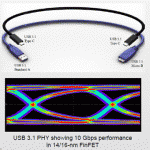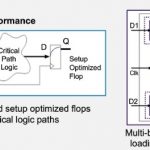Design sizes and complexities have grown exponentially (it’s a Law!), and consequentially the task of silicon test has become proportionally more expensive. The cost of testing a device is proportional to the amount of test data that is applied, and therefore the time it takes, which in turn is proportional to both design size … Read More
Electronic Design Automation
SSD Storage Chips: Basic Interconnect Considerations
The joint development of 3D XPoint memory technology from Intel and Micron has once more brought the spotlight on data centers and chips for solid-state drives (SSDs). The two semiconductor industry giants claim that 3D XPoint memory is1,000 times faster than NAND Flash: the underlying memory content for SSDs. Such developments… Read More
I want to use USB Type C (and I want it now)
USB is certainly the most ubiquitous of the Interface protocols, used in our day to day life to connect multiple systems, as well as in professional segments like industrial or even high performance servers (yes, these systems integrates USB 3 connections). But USB is also one of the protocols able to generate frustration every… Read More
Silvaco 30 Years Ago
It’s Silvaco’s 30 year anniversary. You may already know the dry official story of the early days:
- Founded in 1984 by Dr Ivan Pesic
- In 1984 the initial product, Utmost, quickly became the industry standard for parameter extraction, device characterization and modeling.
- In 1985 Silvaco entered the SPICE circuit
Cadence 2015 Q2 Results
Let’s start by getting the financial stuff out of the way. Revenue was $416 million; non-GAAP operating margin was 28%; non-GAAP EPS was $0.27; and operating cash flow was $122 million (up at lot, it was just $47M in Q1 and $69M in Q2 of 2014).
The thing that the financial types are most interested in are the changes to Cadence’s… Read More
Boost the Market for Interposer and 3D ICs with Assembly Design Kits
The traditional system-on-chip (SoC) design process has fully qualified verification methods embodied in the form of process design kits (PDKs). Why is it that chip design companies and assembly houses have no IC/package co-design sign-off verification process?
Package die are often produced using multiple processes and… Read More
Build Low Power IoT Design with Foundation IP at 40nm
In a power hungry world of semiconductor devices, multiple ways are being devised to budget power from system to transistor level. The success of IoT (Internet of Things) Edge devices specifically depend on lowest power, lowest area, optimal performance, and lowest cost. These devices need to be highly energy efficient for sustained… Read More
Designing an IDCT for H.265 using High Level Synthesis
Math geeks know all about Inverse Discrete Cosine Transforms (IDCT) and a popular use is in the hardware architecture of High Efficiency Video Coding (HEVC), also known as H.265, the new video compression standard and widely used in consumer and industrial video devices. You could go about hand-coding RTL to create an IDCT function,… Read More
Synopsys’ Andreas Kuehlmann on Software Development
Andreas Kuehlmann is the general manager of what is officially now known as the Software Integrity Group of Synopsys, what you might think of as Coverity although they have made some acquisitions too, so they now have a broader technology base. I sat down to talk to him last week.
He was brought up in Germany and came to the US in 1991 … Read More
Power Analysis Needs Shift in Methodology
It’s been the case most of the time that until we hit a bottleneck situation, we do not realize that our focus is not at the right spot. Similar is the case with power analysis at the SoC level. Power has become equally if not more important than the functionality and other parameters of an SoC, and therefore has to be verified earlier … Read More










TSMC vs Intel Foundry vs Samsung Foundry 2026